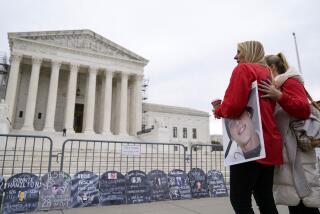Break the Logjam on Bhopal Relief : India-Union Carbide Settlement Could Help the Victims Now
- Share via
Two years ago a cloud of methyl isocyanate escaped the Bhopal plant of Union Carbide India, Ltd. Nearly 2,000 people died quickly. Others are dying more slowly. Thousands more (the Indian government puts the figure at 487,000) say that they have been injured. Families are in disarray; the local economy is in disorder. And the whole business is in the courts. Where a torrent of relief is called for, there is, two years later, only a legal glacier.
Courts are quite properly where injured people go to have their rights declared and compensation for their damages measured. But courts are designed for the ordinary business of social life. Legal systems regularly choke on disasters even smaller than Bhopal’s.
Courts are also designed to address the needs of the litigants--the injured plaintiff, the protesting defendant--but not the needs and interests of others. A lawsuit by a developing nation against an American multinational corporation is, by contrast, a dramatic spectacular whose rehearsal and orchestration can only impede the resolution of what really matters.
The Bhopal tragedy should be settled out of court. If things continue in court as they have been, it will be at least five more years, and more likely 10, before any significant compensation is provided to the victims of Bhopal. In many cases it will not be distributed to the victims even then. They will have died while justice was being served.
Twenty months after the accident a U.S. District Court decided that the courts of India, rather than those of the United States, should hear the cases. That ruling, however, is still subject to appeal. Meanwhile, the Indian government has enacted a statute declaring itself to be the sole representative of all the injured persons, barring the representation of individuals by private Indian lawyers. It would not be at all surprising to see a due-process challenge (and an appeal, of course) to that statute, mounted by the Indian Bar. And still not a single plaintiff’s case has been heard.
Once all of that maneuvering is over--and just when that will be is hard to say--it will still be many months, and perhaps years, before the trials themselves will begin. And when they do, according to sources in India, the complexity and the sheer magnitude of the claims will take at least five and perhaps as many as 15 years to adjudicate. Again there can be appeals concerning any number of legalistic issues, only some of which can be predicted in advance. And if India does secure a judgment in its own courts against the American parent corporation, it will have to seek enforcement of that judgment in the courts of the United States, where again issues of due process arising from all of the preceding stages can be argued--and appealed.
Avoiding these devastating delays is only one reason why a settlement would be vastly better. There are others, which have to do with the nature of judicial decisions.
In other than unusual constitutional cases, courts cannot create new social institutions. In Bhopal it is likely that much of the human damage is continuing. There are present economic losses, to be sure, but for many of the victims what is needed is rehabilitation. A court could require Union Carbide to pay cash to an injured plaintiff. Generally, courts could not require Union Carbide to build, for example, a rehabilitation center. A settlement could.
Investment by Union Carbide in the local economy might more directly address long-range economic-development issues and deliver even greater benefits to the population than would costly cash settlements. No court--at least no American court--could decree that; a settlement could achieve it.
Complex problems such as Bhopal require solutions with many strands: compensation to families for the deaths of the children, parents, wage-earners; for the destruction of property; for the costs of medical care to the injured as well as the dead. But it doesn’t stop there. There is also future medical care, rehabilitation, medical research and education, unemployment compensation and the need for training in new skills, rejuvenation of the local economy and myriad social services to be delivered.
A settlement, but not a court’s decision, could be tailored to both the complex needs of the people of Bhopal and to the possibilities of Union Carbide’s continued involvement in the region.
If the judicial process continues to wend its glacial way, about 10 years from now we may learn how much (if anything) Union Carbide was required to pay. Sometime after that we may know to whom it went. Meanwhile we will have added two more tragedies to the misery of Bhopal: unrecompensed suffering and the loss of an opportunity to address creatively the many-faceted needs of the people there. No judicial system can avoid those further tragedies. The Indian government and Union Carbide, working together, can.
More to Read
Sign up for Essential California
The most important California stories and recommendations in your inbox every morning.
You may occasionally receive promotional content from the Los Angeles Times.










